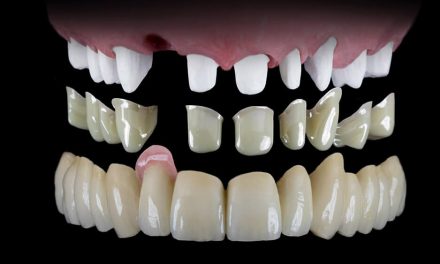Dental prostheses are an indispensable part of life for many people. By replacing missing teeth with a well-fitting denture, the patient regains both function and natural-looking teeth. However, the fit of the dental prosthesis can become loose over time so that patients often think that their prosthesis is broken. Mostly, however, this has been caused by changes in the jawbone that have cause the prosthesis to lose its close fit.
Loose prostheses are not only uncomfortable, but they can also often cause pain. Pressure points in the mouth can become inflamed which causes the patient discomfort. Eating becomes difficult which often impacts the patient’s diet. Food particles can also get stuck under the edge of the prosthesis, causing it to rub and resulting in discomfort.
But why does the prosthesis become loose and no longer fit properly in the mouth? Basically, prostheses are made precisely and individually for a patient by the dentist working closely with a dental technician. As full dentures sit loosely on the mucous membrane of the jaw, they are held in place by their exact fit alone. Jawbones often change over time, however. Bone loss, also called atrophy, is normal, and diseases like osteoporosis can also cause changes to the jawbone. It is therefore important that patients with a loose prosthesis should not simply use a fixative cream, but also consult their dentist.
FINALLY, A PROPER FIT AGAIN
A loose dental prosthesis can be likened to putting on a shoe that’s too big. The shoe stays on the foot and you can walk with it, but because there is no proper grip, every step becomes very uncomfortable! This is very similar to a dental prosthesis that has lost its perfect fit. In the same way that an ill-fitting shoe causes blisters on the foot, the mouth similarly creates pressure points that can cause the patient severe pain. Many patients become worried that they will in fact need a new prosthesis.
But this is not necessarily the case. Frequently, by using special denture acrylic, the existing dentures can be adapted to accommodate the changes that have developed in the jaw. The dentist is the right contact for doing this relining of the prosthesis, which will be done in conjunction with the dental laboratory to ensure a really snug and comfortable fit. Only the base of the prosthesis will be adapted to achieve this.
ARE MINI-IMPLANTS AN ALTERNATIVE?
Another way to make the prosthesis fit well again is by using dental implants. Mini-implants are a proven way to do this and they are comparatively inexpensive. The use of these ensure that the full denture is firmly fixed in the edentulous lower or upper jaw. Small titanium pins are carefully implanted into the jawbone by the dentist. Four to six implants are usually enough to give the full denture proper support again. Usually the dental technician can convert the existing denture to be used with these mini-implants, or a new denture might have to be made.
The counterpart of the implant is worked into the denture. Thereafter the prosthesis can easily be inserted and removed by using a click mechanism. The result is that the patient again enjoys a denture that fits firmly in the mouth again.
WHAT CAN BE DONE TO RELIEVE PAINFUL PRESSURE POINTS IN THE MOUTH?
Simply rinsing with warm salt water can help to relieve pain. Home remedies such as chamomile or arnica tincture will also soothe irritated gums. Disinfectant mouthwashes will also help these spots to heal. However, if these painful pressure points become a chronic problem, you must consult your dentist. And never, ever try to adapt your dental prosthesis yourself!





